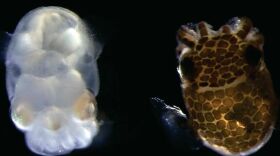
Jon Hamilton
Jon Hamilton is a correspondent for NPR's Science Desk. Currently he focuses on neuroscience and health risks.
In 2014, Hamilton went to Liberia as part of the NPR team that covered Ebola. The team received a Peabody Award for its coverage.
Following the 2011 earthquake and tsunami in Japan, Hamilton was part of NPR's team of science reporters and editors who went to Japan to cover the crisis at the Fukushima Dai-ichi nuclear power plant.
Hamilton contributed several pieces to the Science Desk series "The Human Edge," which looked at what makes people the most versatile and powerful species on Earth. His reporting explained how humans use stories, how the highly evolved human brain is made from primitive parts, and what autism reveals about humans' social brains.
In 2009, Hamilton received the Michael E. DeBakey Journalism Award for his piece on the neuroscience behind treating autism.
Before joining NPR in 1998, Hamilton was a media fellow with the Henry J. Kaiser Family Foundation studying health policy issues. He reported on states that have improved their Medicaid programs for the poor by enrolling beneficiaries in private HMOs.
From 1995-1997, Hamilton wrote on health and medical topics as a freelance writer, after having been a medical reporter for both The Commercial Appeal and Physician's Weekly.
Hamilton graduated with honors from Oberlin College in Ohio with a Bachelor of Arts in English. As a student, he was the editor of the Oberlin Review student newspaper. He earned his master's degree in journalism from Columbia University, where he graduated with honors. During his time at Columbia, Hamilton was awarded the Baker Prize for magazine writing and earned a Sherwood traveling fellowship.
-
The mysterious ailments that became known as Havana syndrome left no physical evidence of injury or disease, according to two government studies.
-
Traumatic brain injuries from intimate partner violence are common, and potentially more severe than those seen in sports.
-
President Biden and former President Trump have both experienced public memory lapses. But brain experts say such slips, on their own, are not a cause for concern.
-
Health, Science & EnvironmentA new generation of blood tests can help doctors diagnose Alzheimer's without a brain scan or spinal tap. But only a few perform as well as traditional tests.
-
Health, Science & EnvironmentThe neurological symptoms of COVID can persist for years after an infection. Scientists are just beginning to understand why.
-
Health, Science & EnvironmentA new atlas of the human brain could help explain abilities like language – and vulnerabilities, like Alzheimer's disease.
-
Researchers have identified 46 genes that can disrupt a process that is critical to early brain development. The finding could help scientists find new treatments for disorders including autism.
-
Health, Science & EnvironmentAn effort to diversify genetic studies has led to a discovery about Parkinson's disease in people of African descent.
-
People seek out art and music that combine sadness and beauty. Scientists and artists say there's good reason why we're drawn to it.
-
A see-through squid is giving scientists an unprecedented view of the brain and other organs in a living animal.










